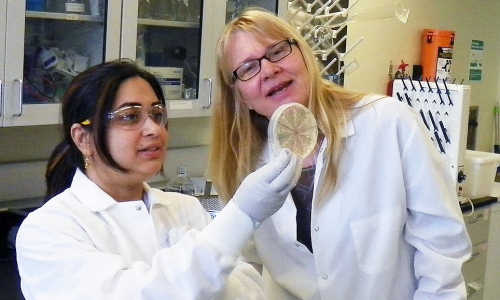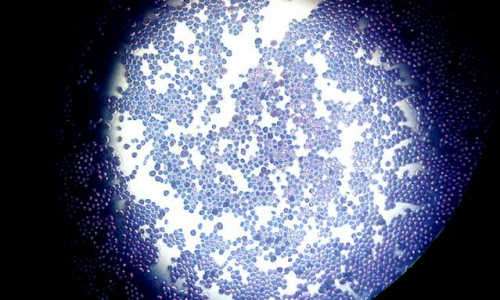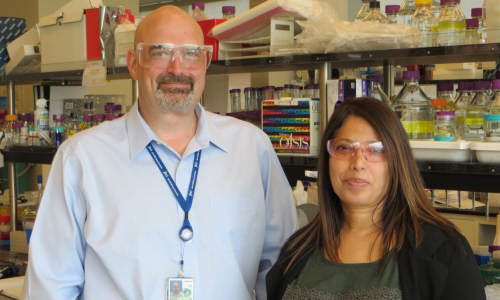Washington State University researchers have found a way to make jet fuel from a common black fungus found in decaying leaves, soil and rotting fruit. The researchers hope the process leads to economically viable production of aviation biofuels in the next five years.
Ahring, right, and Ph.D. student Malavika Sinha look at a new mutant of Aspergillus carbonarius.
The researchers used Aspergillus carbonarius ITEM 5010 to create hydrocarbons, the chief component of petroleum, similar to those in aviation fuels.
Led by Birgitte Ahring, director and Battelle distinguished professor of the Bioproducts, Sciences and Engineering Laboratory at WSU Tri-cities, the researchers published their work in the April edition of Fungal Biology.
The fungus produced the most hydrocarbons on a diet of oatmeal but also created them by eating wheat straw or the non-edible leftovers from corn production.
Fungi have been of interest for about a decade within biofuels production as the key producer of enzymes necessary for converting biomass to sugars. Some researchers further showed that fungi could create hydrocarbons, but the research was limited to a specific fungus living within a specific tree in the rainforest, and the actual hydrocarbon concentrations were not reported.
Ahring’s group has previously been successful in using standard Aspergillus fungi to produce enzymes and other useful products, which have been patented and are under commercialization, so they decided to look into A. carbonarius ITEM 5010’s potential for biofuels.
Fungi are complex microorganisms and are not always easy to work with, Ahring said. They have a complex biology that is often poorly understood.
“Not many people in this world actually do this,’’ she said. “The molecular biology piece of it is complicated.’’
The researchers were assisted by Kenneth Bruno, a researcher at the U.S. Department of Energy’s Pacific Northwest National Laboratory, who developed a method essential for the genetic manipulation of A. carbonarius. The research received funding from the Danish Council for Strategic Research under the program for Energy and Environment.
Using fungi for hydrocarbon and biofuels production is better than other methods because they do the work themselves, bypassing multiple complicated chemical processes required by other biofuel production methods. Fungi also have great potential to create the fuel at low cost, Ahring said.
She suspects the fungi produce hydrocarbons, large compounds that are costly for the organism to produce, as a protective mechanism. Her group showed that fungi react to bacterial attacks by increasing their hydrocarbon production.
The researchers are now working to optimize the fungi’s hydrocarbon production and improve biochemical pathways through genetic engineering. They have obtained mutants with a higher production level and are working on improving these strains by using gene coding for specific hydrocarbons out of blue green bacteria and algae.
It’s the same challenge faced by mold researchers, more than a generation ago, who found they could only produce a tiny amount of their product, Ahring said. Eventually, they optimized production of their product, which became known as antibiotics.
“It’s very promising,’’ she said. “I think that the fungus-based fuels are something that is going to happen. It’s a tremendous opportunity. ’’
Story Source:
The above story is based on materials provided by Washington State University.





